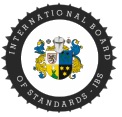Business Certification - Accredited Exams and Programs




Links
Welcome to the International Board of Standards - Graduate Board of Management GBM ™ and the Business Accreditation Council and Commission. Our International Board of Standards ™ and Certifying Body regulates standards and accredited educational criteria and issues board certification in the business management areas. The Founders of the GBM Graduate Board of Management and Commission are professors and industry experts from around the globe. The International Board of Standards and Accreditation Commission awards specialized board certifications, designations, and charters in the business, management, marketing, and consulting fields to those who hold internationally accredited education, government recognized degrees and documented management credentials and experience.
The International Board of Standards and the Graduate Board of Management takes pride in approving of and promoting the best government recognized and accredited business and management education in the world. If you have an earned & accredited degree from an AACSB International, ACBSP Business School, EFMD, EQUIS or ABA Accredited Law School you may be eligible for Membership and Certification from our Academy upon meeting the Board's Graduate Requirements. The International Board of Business Certification has fellows and members in over 150 countries around the world.